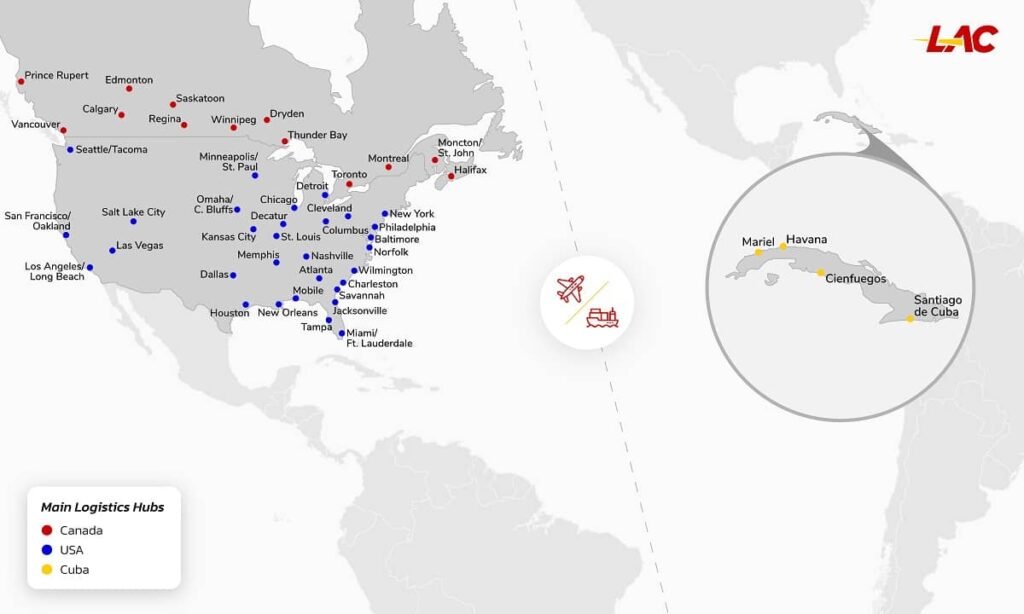
Exporting goods to Cuba, whether it is for the first time or on a regular basis, can be a challenging experience. There are several key elements to consider when shipping to a country like Cuba.
Suppose you are in Canada or the US and not entirely familiar with the Latin American market. In that case, you should consider a cargo shipping company that is familiar with the business culture, language, and customs regulations, and has a proven track record of success in freight shipping to Cuba.
For over 25 years, LAC has supported North American businesses with expert freight forwarding solutions to Cuba. Our experience and strong carrier network allow us to offer a full range of reliable, cost-effective shipping services.
With LAC, your cargo reaches Colombia safely, on time, and with complete peace of mind.
When shipping to Cuba, it’s important to understand that business practices and regulations differ significantly from those in the US or Canada. Here are some key points to keep in mind:
These insights can help you navigate the unique business landscape in Cuba and ensure smoother shipping experiences.

Cuba presents a unique and exciting opportunity for North American businesses seeking to expand their reach. Despite its unique challenges, the island nation offers a wealth of potential benefits. Cuba boasts a well-educated population and a growing consumer base, offering a largely untapped market for North American goods and services. Its strategic location at the crossroads of the Caribbean and the Americas makes it an ideal gateway for businesses looking to expand their regional footprint.
Additionally, venturing into the Cuban market allows for diversification, reducing dependence on established markets. The Cuban government actively encourages foreign investment in specific sectors, providing a supportive environment for new ventures. By partnering with an experienced logistics provider like Latin American Cargo, you can navigate the complexities of Cuban trade regulations and capitalize on the promising opportunities this market presents.
Our team of logistics experts is ready to optimize your supply chain and deliver seamless shipping solutions.

MAIN IMPORTS:
MAIN EXPORTS:
INDUSTRIES WITH STRONG BUSINESS OPPORTUNITIES:
PRINCIPAL TRADING PARTNERS:
Navigating the complexities of international trade, especially to a unique market like Cuba, requires a logistics partner who understands the specific challenges involved. Cuba has distinct laws, regulations, customs procedures, and cultural nuances that can impact your shipping experience. To successfully enter the Cuban market, you need a partner who not only understands the logistics but also the cultural and business landscape.
Our team of experts at Latin American Cargo offers superior freight forwarding services and competitive rates for your cargo shipping to Cuba. Our combined experience, extensive knowledge, logistics skills, and local connections will ensure a smooth process and guarantee that your goods are transported quickly, safely, and worry-free, even amidst Cuba’s unique trade environment.
We prioritize your company’s success. If you’re aiming for a successful venture in Cuba, Latin American Cargo is your ideal freight forwarding partner.
First-time shippers to Cuba face a complex regulatory landscape with strict guidelines, prohibitions, and restrictions. Success depends on understanding both formal Cuban laws and informal practices that govern maritime and air cargo operations. Proper preparation helps avoid costly delays and complications during the customs clearance process.
Every international shipment to Cuba requires comprehensive documentation to clear customs successfully. The core documents include:
The packing list deserves special attention—it must contain precise descriptions of all items, avoiding vague or generic terms that trigger customs delays. Cuban authorities conduct thorough inspections to assess duties and tariffs based on both shipment value and documentation quality. Incomplete or unclear paperwork often results in customs officials assigning their valuations, which typically exceed declared values.
Complete recipient information is non-negotiable. This includes accurate addresses, email contacts, and phone numbers to ensure successful delivery. Certain product categories require additional certifications—for example, food products need health certificates, while other goods may require specific permits based on their nature.
Working with experienced freight forwarders who understand Cuban customs procedures can significantly streamline the process and help navigate the regulatory complexities.
Cuba maintains strict import controls with clear prohibitions on numerous product categories. Banned items include:
Shipments originating from the United States, Canada, and Mexico face additional layers of complexity due to embargo and sanctions laws. These restrictions often limit or completely prohibit certain types of trade, making compliance verification essential before shipping.
The customs duty calculation process is straightforward in principle—duties are assessed on total shipment value—but can become complicated when documentation is incomplete or unclear. In such cases, Cuban customs authorities may impose their valuation, which invariably results in higher fees than originally declared.
Sanctions and embargo considerations add another compliance layer, particularly for U.S.-related shipments. Certain Cuban entities and specific goods remain restricted for trade, requiring thorough compliance checks to avoid legal complications.
LAC simplifies shipping to Cuba. Our extensive experience navigating these complexities has equipped us with a deep understanding of Cuban customs procedures.

| Port / Airport Name | Location | Key Features & Cargo Types | Highlights |
| Havana Port (Puerto de La Habana) | Northwestern coast (Havana) | Largest and busiest port; container ships, general cargo, sugar, molasses, minerals, citrus fruits; cruise terminal | 14 berths; handles ~270,000 TEU annually; key maritime hub for imports/exports |
| Mariel Port | 40 km west of Havana | Modern container terminal; cement, oil, bulk sugar, general cargo; can handle Neo-Panamax vessels | 702m berth; capacity ~3 million TEUs/year; strategic transshipment hub |
| Santiago de Cuba Port | Southeastern coast (Santiago) | Minerals, sugar, molasses exports; general cargo, grain, machinery, fuel imports | Important commercial port with extensive storage; ~100 vessels/year |
| Matanzas Port | Northern coast (Matanzas) | Sugar, molasses, liqueurs exports; fertilisers, oil, general cargo imports | Noted for cultural importance; ~70 vessels/year |
| Manzanillo Port | Eastern Cuba (Granma province) | Exports: sugar, tobacco, timber; imports: petroleum products | Transshipment centre, anchorage port with CBM for petroleum |
| Cienfuegos Port | Southern coast (Cienfuegos) | Sugar, general cargo, tankers | 5 piers, 3 buoys; ~100 vessels/year |
| Guantanamo Port | Southeastern coast (Guantanamo) | Segregated inner harbour for commercial vessels; proximity to the US Naval Base | Important local commercial port |
| Cardenas port | Northwestern coast | Sugar products exports | Single pier, 4 berths |
| Casilda Port | Southern part (near Trinidad) | Loading port for Trinidad; general cargo | Pier with 2 berths; cargo loaded/discharged at anchor |
| Puerto Padre Port | Northern coast (Puerto Padre Bay) | Sugar, molasses exports; fuel oil imports | Well-protected, spacious facilities |
| Airport Name | Location | Key Features | Notes |
| José Martí International Airport | Havana | Main international air cargo gateway; handles general cargo, pharmaceuticals, perishable goods | Cuba’s largest airport for air freight |
| Antonio Maceo Airport | Santiago de Cuba | Regional cargo hub; supports mining and agricultural exports | The growing importance of eastern Cuba |
| Abel Santamaría Airport | Santa Clara | Supports central Cuba’s cargo shipments, including sugar and industrial products | Medium-sized cargo airport |
| Ignacio Agramonte Airport | Camagüey | Handles agricultural and general cargo | Important for central-eastern Cuba |

Ship containers or any type of goods to Cuba with our ocean and air freight forwarding services. Our skills and knowledge make us your most reliable partner when shipping freight to Cuba from anywhere in the world: the US, Canada, China, Europe, and more.
Learn from the experiences of those who matter most: our customers